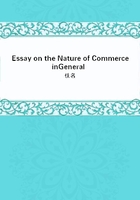
第55章
In France the cost of minting is deducted, usually 1?per cent, i.e. the price for coin is always higher than for uncoined metal. To know whether France loses in the general valance of her trade, it will suffice to know whether the bankers send French coins abroad. If they do so it is a proof that they do not find bullion to buy for export, since the bullion though at a lower price than coined money in France, is of greater value than these coins in foreign countries by at least 1?per cent.
Though the exchanges rarely vary apart from the balance of trade between one country and others, and though this balance is naturally the mere difference in value of the goods and merchandise which the state sends to other countries and receives from them, yet there are often circumstances and accidental causes which cause considerable sums to be conveyed from one state to another without any question of merchandise or trade, and these causes affect the exchanges just as the balance of trade would do.
Such are the sums of money which one state sends into another for its secret services and political aims, for subsidies to allies, for the upkeep of troops, Ambassadors, noblemen who travel, etc., capital which the inhabitants of one state send to another to invest in public or private funds, the interest which these inhabitants receive annually from such investments, etc.
The exchanges vary with all these accidental causes and follow the rule of the transport of silver required. In considering the balance of trade matters of this kind are not separated, and indeed it would be very difficult to separate them. They have very certainly an influence on the increase and decrease of circulating money in a state and on its comparative strength and power.
My subject does not allow me to enlarge on the effects of these accidental causes: I confine myself always to the simple views of commerce lest I should complicate my subject, which is too much encumbered by the multiplicity of the facts which relate to it.
Exchanges rise more or less above par in proportion to the great or small costs and risks of the transport of money and this being granted they naturally rise much more above par in the cities or states where it is forbidden to export money than in those where its export is free.
Suppose that Portugal consumes regularly every year considerable quantities of woollen and other manufactures of England, as well for its own people as for those of Brazil, that it pays for them partly in wine, oils, etc., but for the surplus payment there is a regular balance of trade remitted from Lisbon to London. If the King of Portugal rigorously prohibits under penalty not only of confiscation but of life the transport of any gold or silver metal out of his States, the terror of this prohibition will in the first place stop the Bankers from meddling about sending the balance. The price of the English manufactures will be kept in hand at Lisbon. The English merchants unable to receive their funds from Lisbon will send no more cloth thither. The result will be that cloth will become extraordinarily dear. Though their price has not gone up in England they cease to be sent to Lisbon because their value cannot be recovered. To have these cloths the Portuguese nobility and others who cannot do without them will offer twice the usual price, but as they cannot get enough of them without sending money out of Portugal, the increased price of cloth will become the profit of any one who in spite of the prohibition will export gold or silver. This will encourage various Jews and others to take gold and silver to English vessels in the port of Lisbon, even at the risk of their lives. They will gain at first 100 or 50 per cent in this traffic and this profit is paid by the Portuguese in the high price they give for the cloth. They will gradually familiarise themselves with this manoeuvre after having often practised it successfully, and at length money will be seen to be put on board English ships for a payment of 2 or 1 per cent.
The King of Portugal lays down the law or prohibition. His subjects, even his courtiers, pay the cost of the risk run to circumvent and elude it. No advantage then is gained by such a law, on the contrary it causes a real loss to Portugal since it causes more money of the state to go abroad than if there were no such law.
For those who gain by this manoeuvre, whether Jews or others, send their profits abroad, and when they have enough of them or when they take fright they often themselves follow their money.
If some of these lawbreakers were taken in the act, their goods confiscated and their lives forfeited, this circumstance and execution instead of stopping the export of money would only increase it, because those who formerly were satisfied with 1 or 2 per cent for exporting money will ask 20 or 50 per cent, and so the export must always go on to pay the balance.
I do not know whether I have succeeded in making these reasons clear to those who have no idea of trade. I know that for those who have practical knowledge of it nothing is easier to understand, and that they are rightly astonished that those who govern states and administer the finances of great kingdoms have so little knowledge of the nature of exchanges as to forbid the export of bullion and specie of gold and silver.
The only way to keep them in a state is so to conduct foreign trade that the balance is not adverse to the state.